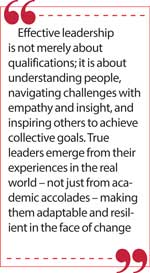Tuesday Feb 17, 2026
Tuesday Feb 17, 2026
Friday, 20 December 2024 00:22 - - {{hitsCtrl.values.hits}}

By balancing qualifications with real-world exposure and diverse experiences, organisations can promote a culture where innovation flourishes and resilience thrives
 In a world where academic achievements often overshadow other dimensions of human potential, the belief that qualifications alone define effective leadership is a widespread misconception. While degrees and certifications can indicate intellectual capability, they fail to capture the true essence of leadership. Authentic leadership transcends formal education; it is a complex interplay of emotional intelligence, empathy, vision, and the ability to inspire action. These attributes are cultivated through experience, exposure, self-awareness, and an innate understanding of human behaviour and societal dynamics.
In a world where academic achievements often overshadow other dimensions of human potential, the belief that qualifications alone define effective leadership is a widespread misconception. While degrees and certifications can indicate intellectual capability, they fail to capture the true essence of leadership. Authentic leadership transcends formal education; it is a complex interplay of emotional intelligence, empathy, vision, and the ability to inspire action. These attributes are cultivated through experience, exposure, self-awareness, and an innate understanding of human behaviour and societal dynamics.
Sri Lanka’s rich historical and contemporary context serves as a powerful reminder of this truth. The nation’s history is shaped by influential figures whose impact stemmed not from academic credentials but from their ability to connect with people and navigate intricate societal challenges. For instance, D.S. Senanayake, the first Prime Minister of independent Sri Lanka, demonstrated this principle through his pragmatic approach and capacity to unify a fragmented populace. His success was rooted in a profound understanding of his nation’s needs rather than formal qualifications.
The modern leadership landscape
In today’s corporate and socio-political arenas, the limitations of equating qualifications with leadership have become increasingly apparent. The demands of globalisation, technological transformation, and an ever-diversifying workforce require leaders who can think beyond conventional boundaries. The current landscape calls for leaders who possess critical thinking skills, not merely to analyse problems but to envision innovative solutions that transcend traditional frameworks.
They must exercise sound judgment, balancing immediate challenges with long-term impacts while navigating the complexities of an interconnected world. Effective communication is essential; leaders must articulate their vision with clarity and empathy, engaging diverse audiences and fostering collaboration. Above all, they must inspire trust by building credibility through consistency, integrity, and a strong commitment to the greater good.
Experience over theory
These vital skills are not typically acquired in lecture halls or through solitary textbook study, where theoretical knowledge often remains detached from real-world complexities. While academic learning provides a foundation, it is lived experience that truly shapes effective leadership. The ability to adapt to changing circumstances, navigate interpersonal dynamics, and make decisions under pressure cannot be learned solely from books. Leadership requires an intuitive grasp of human behaviour, emotional intelligence, and resilience, qualities nurtured through direct engagement with the world rather than remaining within the comfort zone of theoretical study. True leaders are shaped by their experiences rather than the accumulation of degrees.
The importance of emotional intelligence
Recent research and contemporary leadership theories further emphasise the importance of traits such as emotional intelligence, ethical judgment, and the ability to foster collaborative environments. Leaders who excel in these areas are better equipped to address organisational challenges and motivate their teams toward shared goals. In Sri Lanka, where cultural sensitivities and interpersonal relationships significantly influence leadership success, these qualities are particularly crucial. In summary, effective leadership is not merely about qualifications; it is about understanding people, navigating challenges with empathy and insight, and inspiring others to achieve collective goals. True leaders emerge from their experiences in the real world – not just from academic accolades – making them adaptable and resilient in the face of change.
 Qualities that define a true leader
Qualities that define a true leader
Key components of effective leadership
Effective leadership comprises several key components that contribute to organisational success:
The way forward
As organisations navigate today’s complexities, strong leadership combined with a positive mindset stands as a cornerstone for success. By balancing qualifications with real-world exposure and diverse experiences, organisations can promote a culture where innovation flourishes and resilience thrives. Investing in leadership development while nurturing an inclusive culture empowers teams to transform challenges into growth opportunities. Organisations prioritising these elements will not only adapt but also lead the way toward sustainable success. A true leader is not defined by titles or qualifications but by their ability to inspire, connect, and navigate through complexity. Essential qualities such as emotional intelligence, empathy, critical thinking, and adaptability form the bedrock of effective leadership. In today’s ever-evolving world, these human-centred traits distinguish exceptional leaders enabling organisations to thrive in the long run. Ultimately, leadership is not defined by credentials but by the legacy one leaves behind.
(The writer is Deputy General Manager Human Resources and Administration at Sri Lanka Insurance.)